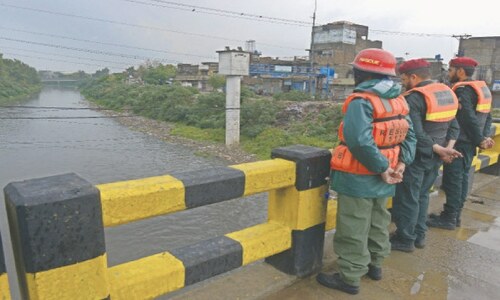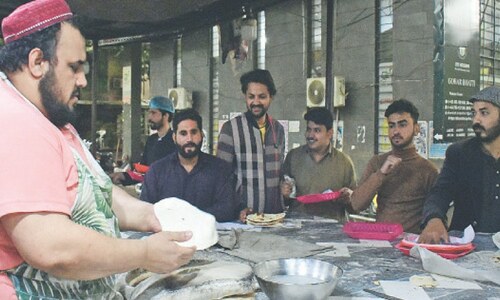ISLAMABAD: As the world celebrates 70 years of the United Nations, the chequered history of peacekeeping operations — one of the organisation’s primary real-world responsibilities — were the focus of a panel discussion on Wednesday.
“It is very difficult to transform a soldier into a peacekeeper,” said retired Lt-Gen Sikander Afzal.
A veteran of UN peacekeeping missions to Somalia and Liberia, he said that the way things happened on the ground were often different from the instructions received from UN headquarters.
UN70 panel sees candid discussion about efficacy of peace missions in an unpeaceful world
“I teach my soldiers how to kill and ask questions later. Peacekeepers need to be far more restrained.”
Hosted by the Centre for International Peace and Stability at Nust in connection with UN70 celebrations, ‘Peacekeeping: Partnering for Global Peace and Development’ saw a distinguished panel of experts share candid views regarding the past performances of peacekeeping operations, as well as the challenges confronting those who carry out this most sensitive of the UN’s functions.
But the former general was not the only one who made such admissions. At the outset, Dr Shahid Ahmad Hashmad from the Nust Institute of Peace and Conflict Studies set the stage when he said: “The UN often falls short of the global community’s expectations”.
Acknowledging Pakistan’s contribution to UN peacekeeping missions, UN Resident Coordinator for Pakistan Neil Buhne said that Pakistan was taking the bulk of the burden of operations, adding that it had been the second-largest contributor of peacekeeping troops in recent years.
“The current military adviser to the head of peacekeeping operations is a Pakistani; Lt-Gen Maqsood Ahmed,” he said, highlighting Pakistan’s central role in peacekeeping operations since the first such force was sent to Congo in 1960. “Pakistan has sacrificed around 150 soldiers in peacekeeping missions,” he said.
But Mr Buhne made no attempt to sugar-coat the harsh realities of peacekeeping operations. Quoting the report of a high-level panel — released in June this year — that examined peacekeeping operations, he said that four recommendations had been made to improve the efficacy of peacekeeping missions in a world where “number of peace operations are deployed in an environment where there is little or no peace to keep”.
Firstly, politics must drive the design of peacekeeping operations, he said, adding that mission must be suited to the political situation of the area where forces are sent.
Secondly, he said the full spectrum of UN peace operations must be more flexible to respond to changing needs on the ground. This was important because there was an impression that there was a template for most peace operations, which needed to be changed.
Thirdly, he said, the partnership between humanitarian programmes and peacekeeping should be stronger to support the people on the ground. Lastly, he said, the UN Secretariat must become more field-focused and operations must be more people-centric.
Relating his experiences in the field, Lt-Gen Afzal said, “Soldiers need clear instructions; the UN only provides guidelines.”
He presented real-life scenarios before the audience and asked them how they would respond to a certain situation, given the limitations that UN guidelines imposes on soldiers on peacekeeping missions.
He also stressed the importance of scenario-based training for peacekeepers to better equip them for the challenges of the field.
Asim Iftikhar, a veteran of Pakistan’s permanent mission to the UN, joked that if peacekeeping operations were done away with, the UN Security Council would be “out of business”.
Lt-Col Sobia Asim from the Army Medical Corps, who was part of the peacekeeping mission sent to Darfur in 2007, also shared her experiences and stressed the need for integrating women in peacekeeping operations, because “women see events differently, from a more humanitarian perspective”.
Published in Dawn, October 15th, 2015
On a mobile phone? Get the Dawn Mobile App: Apple Store | Google Play














































Dear visitor, the comments section is undergoing an overhaul and will return soon.